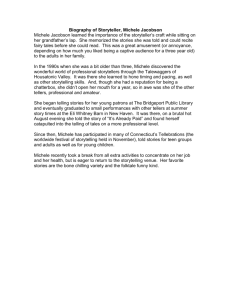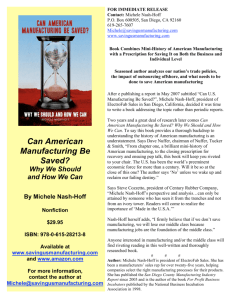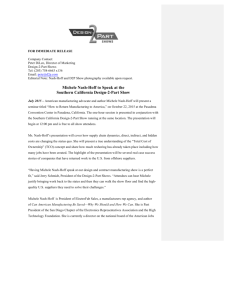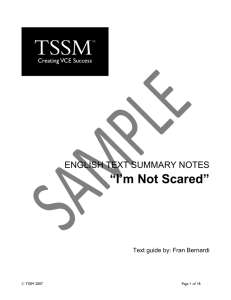I'm Not Scared Theme Work
advertisement
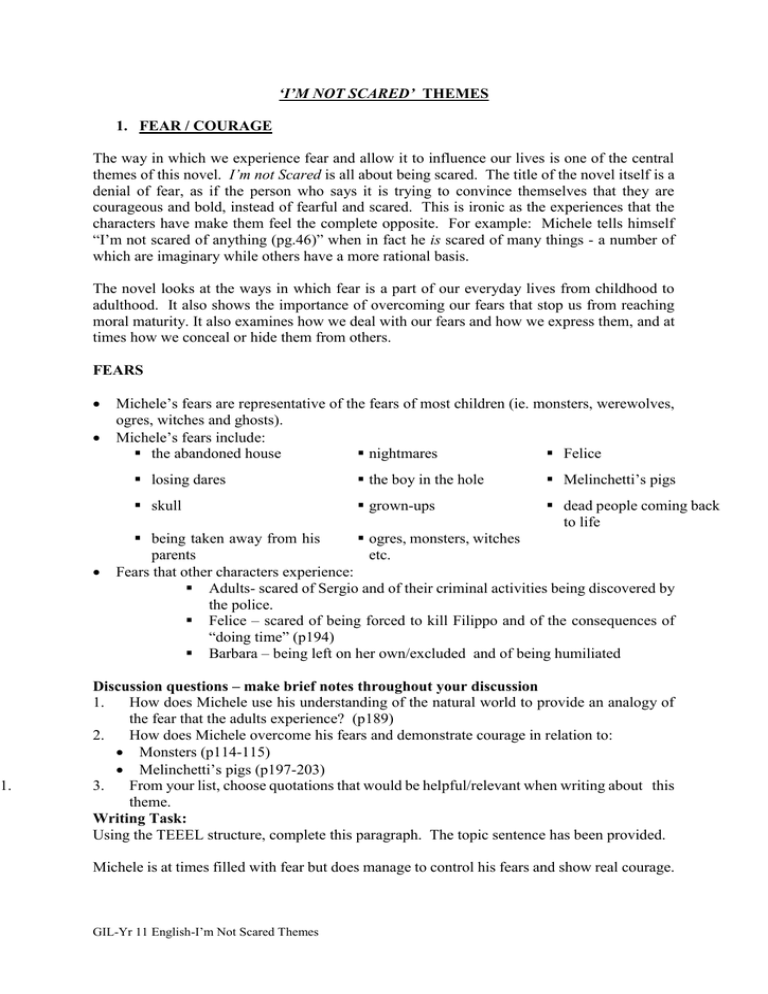
1. ‘I’M NOT SCARED’ THEMES 1. FEAR / COURAGE The way in which we experience fear and allow it to influence our lives is one of the central themes of this novel. I’m not Scared is all about being scared. The title of the novel itself is a denial of fear, as if the person who says it is trying to convince themselves that they are courageous and bold, instead of fearful and scared. This is ironic as the experiences that the characters have make them feel the complete opposite. For example: Michele tells himself “I’m not scared of anything (pg.46)” when in fact he is scared of many things - a number of which are imaginary while others have a more rational basis. The novel looks at the ways in which fear is a part of our everyday lives from childhood to adulthood. It also shows the importance of overcoming our fears that stop us from reaching moral maturity. It also examines how we deal with our fears and how we express them, and at times how we conceal or hide them from others. FEARS Michele’s fears are representative of the fears of most children (ie. monsters, werewolves, ogres, witches and ghosts). Michele’s fears include: the abandoned house nightmares Felice losing dares the boy in the hole Melinchetti’s pigs skull grown-ups dead people coming back to life being taken away from his ogres, monsters, witches parents etc. Fears that other characters experience: Adults- scared of Sergio and of their criminal activities being discovered by the police. Felice – scared of being forced to kill Filippo and of the consequences of “doing time” (p194) Barbara – being left on her own/excluded and of being humiliated Discussion questions – make brief notes throughout your discussion 1. How does Michele use his understanding of the natural world to provide an analogy of the fear that the adults experience? (p189) 2. How does Michele overcome his fears and demonstrate courage in relation to: Monsters (p114-115) Melinchetti’s pigs (p197-203) 3. From your list, choose quotations that would be helpful/relevant when writing about this theme. Writing Task: Using the TEEEL structure, complete this paragraph. The topic sentence has been provided. Michele is at times filled with fear but does manage to control his fears and show real courage. GIL-Yr 11 English-I’m Not Scared Themes 2. MORALITY / EVIL Michele’s sense of obligation – to keep one’s word and be compassionate – is stronger than his fear of what his father might say or do. This judgement is reinforced in the text as a whole. Even though Michele sometimes knows that he has every right to feel afraid, he still feels compelled to act on his moral obligations. he knows that even though he “was scared’ (p95), that he has to go see Filippo especially after he sees Filippo’s mother on television and her plea for his return; although he has promised his father that he will not visit Filippo, he feels obliged to honour his promise to Filippo that he will visit him again; his promise to Filippo outweighs his oath made to his father, as he knows that “he wouldn’t be doing anything wrong” (p161) and that without his visit, Filippo has noone to provide him company or show him kindness. Discussion question – make brief notes throughout your discussion 1. 2. 3. List other examples/evidence of Michele demonstrating his moral behaviour and sense of justice/duty. Discuss examples of ‘evil’ behaviour in the novel, grouping them under subheadings such as: greed corruption physical violence bullying verbal abuse/threats One of the most basic moral lessons that the novel provides, is that entrapment of humans as well as animals is wrong, but that freedom and liberty is good. Each image reinforces the idea that to confine any living creature against their will is a perversion of the natural order of things. The most heroic action of the novel is when Michele liberates Filippo and encourages him to overcome his fear and seek refuge. “You’re not scared. There’s nothing to be scared of” (p 214) Discuss other images of entrapment or confinement in the novel. 4. From your list, choose quotations that would be helpful/relevant when writing about this theme. Writing Task: Using the TEEEL structure, complete this paragraph. The topic sentence has been provided. Ammaniti’s use of symbolism and imagery deepens readers’ understanding of the evil present in Acqua Traverse. GIL-Yr 11 English-I’m Not Scared Themes 3. TRUST AND LOYALTY / BETRAYAL Throughout the text, there are many challenges to loyalties, not only to friends and family, but also to principles and values. When loyalties are set aside, it leads to feelings of betrayal and abandonment. When the test of loyalty fails, there are often longer-term consequences. Although, initially, Michele has complete trust in his friends and family, the ways in which they betray him show how fragile trust is. Trust needs to be earned again and this is one of Michele’s most endearing qualities. He never holds grudges – he is always accepting when those close to him try to regain his trust, or show trust in him. Michele is genuinely touched by Filippo’s trust in him that he would keep his promise and return to him (p 136) but as soon as Michele is discovered at the hole, and swears an oath never to return to his father, this promise becomes very difficult for him to keep. Michele worries about Filippo’s wellbeing just as much as he worries that Filippo will think that he didn’t keep his promises (p161-162). When considering the threat to Filippo’s life, this doesn’t appear to be too significant. TRUST BETWEEN MICHELE & SALVATORE Their relationship appears to be secure; however, it is really very vulnerable. Michele entrusts Salvatore with his ‘secret’ about Filippo but Salvatore lets him down and betrays his trust. This almost ruins their friendship. ‘My whole body was hurting…but especially my heart. Salvatore had broken it….he was my best friend…we had even made a vow of eternal friendship…Salvatore had betrayed me.’ (pg.148) Later when they are playing with their friends, Salvatore attempts to re-establish the friendship by offering to ‘sacrifice’ himself in the game of Den so that Michele can win the game. The plan depends on Michele’s trust in Salvatore to do as he says he will – act as a decoy by distracting Skull so that Michele can win. The strategy is successful and both boys reach the carob tree. Their combined effort in defeating Skull shows their renewed trust and reinforces the novel’s message that ‘all innocent people should be free from capture and entrapment’. TRUST BETWEEN MICHELE AND HIS FATHER The trust that Michele places in his father is more complex. Although he discovers his father’s role in the kidnapping of Filippo and witnesses his father threaten to cut off Filippo’s ears, he still believes what his father says and trusts in his overall goodness. Discussion questions – make brief notes throughout your discussion 1. Why is Michele so upset that Salvatore told Felice about Filippo? How does this affect their relationship. 2. How did Michele deal with the clash of loyalties that he faced when he set off to rescue Filippo at the end of the novel? 3. From your list, choose quotations that would be helpful/relevant when writing about this theme. 4. FAMILY BONDS GIL-Yr 11 English-I’m Not Scared Themes The importance of family bonds in relation to individual happiness and the wellbeing of the community are represented in three ways: 1. Devastating effect of the kidnapping on the village 2. The influence of parents on their children’s personality traits and moral values 3. Images of the natural world 1. The effects of the kidnapping on the village: - from Michele’s point of view the taking away of Filippo from his mother is morally wrong. The adults have betrayed their own family responsibilities - Michele’s relationship with his father the bogeyman who ‘takes the children away and sells them to the gypsies’ (p87), can never be the same and comes to a logical climax at the end when Pino shoots his own son. 2. Acquiring values - Although the children get their moral values and personality traits from their parents, they are also able to make their own independent judgements (i.e. Michele and his refusal of Salvatore’s hand-me-downs as his mother said that ‘we didn’t accept charity from anyone” (p129) - Pino and Teresa resort to criminal activities rather than accept charity is an example of how their strong moral code is compromised in their desperation to leave Acqua Traverse. Although they have been successful in giving Michele a strong sense of morals, their concerns with the material aspects of life are far more important to them. - Salvatore appears to be aloof like his mother and aunt from the rest of the village also and when he betrays Michele, it is proof of Teresa’s opinion of the family that they thought that they were better than the rest of the village (p148). 3. Natural World images - The repeated images reinforce the value and integrity of family bonds. The wasps that build their nest even when Remo continually destroys it (p175,207-208). - This nesting instinct has been corrupted in the human, social world. - The nurturing, protective instincts of parents in the animal world, sets the standard for human behaviour. In this way we see that the village adults behaviour is not only legally wrong, but also unnatural. - - Remo’s destruction of the nest represents the destructive forces that threaten social and family structures. While Michele is the sensitive and appreciative observer of the natural world, Remo is more selfish and intent on acting upon the world for his own pleasure (similar to Sergio who similarly squashes a moth against the wall without a second thought. pg.166). Task: From your list, choose quotations that would be helpful/relevant when writing about this theme. GIL-Yr 11 English-I’m Not Scared Themes 5. CHILDHOOD INNOCENCE TO AWARENESS Michele is symbolic of the innocence of childhood and through him, it is shown just how precious it is yet how easily it can be destroyed like the shattered glass door Michele remembers breaking ‘into a billion neat little cubes’ (p149). Once innocence has been shattered it cannot be restored. An example of this is the absolute trust that Michele has in his father and how it can never be restored once he compares his father to ‘the bogeyman’ (p87). Childhood innocence allows children to understand and negotiate the world around them in a respectful and optimistic way. Michele for instance, never questions whether it is right or wrong to be giving food and drink to Filippo nor of trying to keep his promises of cleaning Filippo and passing on his mother’s message of love to him. Through Michele’s narration throughout the novel, concepts such as the natural world, children’s games and the conflicts and ambitions of adults, are presented from a child’s point of view. Michele is innocent of causing any real harm (despite the hen that was killed for no good reason), but he struggles to understand what others do have the capacity to be cruel and malicious. Although he is familiar with the natural world and the whole life and death cycle, it is the violence that is carried out by the children’s parents that appears to Michele to be irrational and destructive. However, not all the children in the novel innately possess this quality. If you look at Skull and Remo for instance, they show how negative, destructive attributes can be extended into adulthood, leading to more sinister criminal activities of the Sergios and Felices in the world. It may be argued that their qualities are internalised in their upbringing as they are so far removed from Michele in terms of temperament. Discussion questions – make brief notes throughout your discussion. 1. What are the adult issues that confront Michele? 2. What strategies does Ammaniti use to constantly remind readers that Michele is only a child? 3. From your list, choose quotations that would be helpful/relevant when writing about this theme. GIL-Yr 11 English-I’m Not Scared Themes Extension work NATURAL ORDER VERSUS SOCIAL DISORDER Michele continually assesses his experiences against natural phenomena with which he is familiar. As the narrative develops, Michele becomes more aware of the gap between natural order and the social order that has arisen from the adults’ behaviour. While Michele is a good observer of the natural world, the adults shut themselves away in their houses, unable to see beyond their frustrations and ambitions. They lack the ability to observe and appreciate the beauty and richness of the world that they are actually in. 4. Make a list of all the comparisons and analogies Michele makes of people and his experiences, with the natural world. Example Barbara – scrambles ‘like a demented sow’ and ‘swelled up like a turkey’ (pg.4) 2. What moral lessons has Michele learnt from his observations of the natural world? 3. When Michele discusses the wasps with his father Pino on page 175, what does his father’s response reveal about the value he has placed on natural forces? THE POWER OF STORYTELLING Throughout the novel, Michele’s character conveys a strong message about the power of storytelling and about the consequences when they dry up. Storytelling binds its participants together, just as silence as a response to a desire for knowledge drives people apart. Examining how the conversations between Michele and his father close down, when Michele refuses to disclose where he rides during the day, and Pino in return is unwilling to talk about his travels ‘in the North’, it is evident that they grow further apart. If you contrast this with the eccentric stories told by Filippo however, it is a way in which Filippo & Michele bond together and a strong friendship is formed. Discussion questions: 1. Summarise the stories that are told in the narrative that generate: fear amongst Michele and/or the children. GIL-Yr 11 English-I’m Not Scared Themes obedience or compliance Activity: Contrasts There are many contrasts to be seen in the text. Use the table below to collect examples of these contrasts: Kindness Examples: Cruelty Examples: Courage Examples: Fear Examples: Support Examples: Bullying Examples: Good Examples: Evil Examples: Dreams Examples: Nightmares Examples: Villagers Examples: Outsiders Examples: Southerners Examples: Northerners Examples: Good luck Examples: GIL-Yr 11 English-I’m Not Scared Themes Bad luck Example
